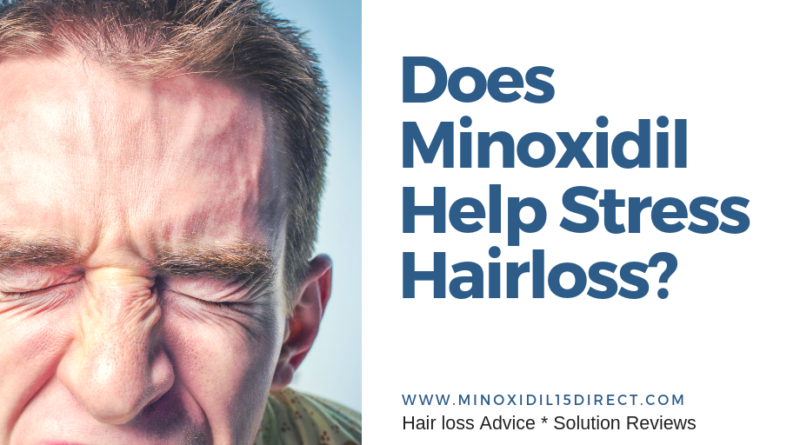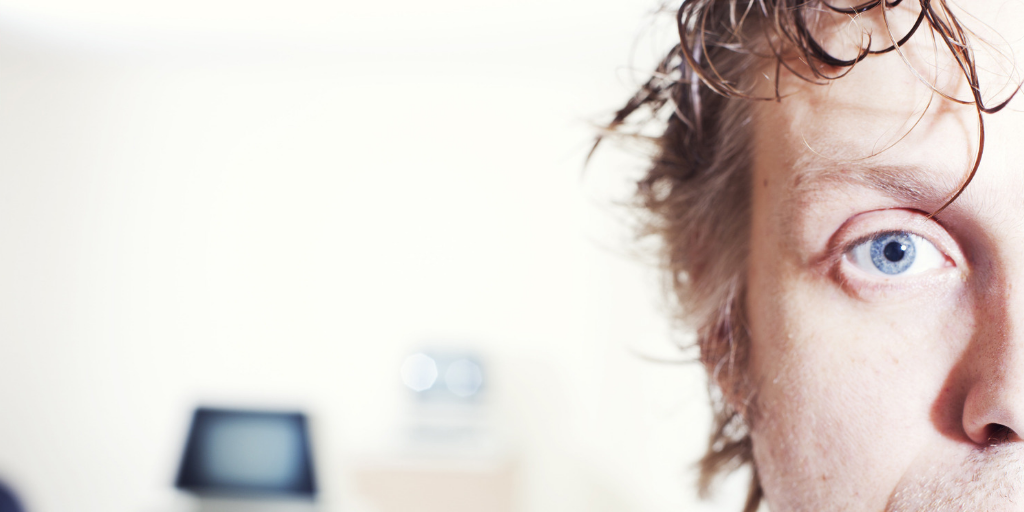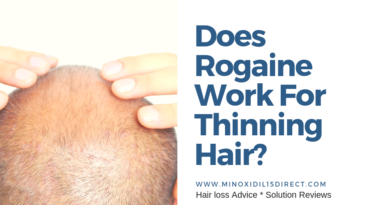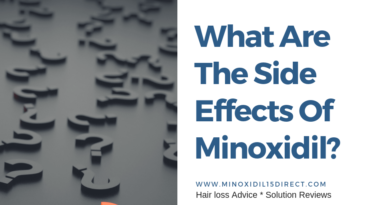Contents
Hi guys, today I've been looking at the effects of stress on hair loss and if Minoxidil can help this or not. It's been quite an eye opener researching this topic.
So does minoxidil help stress hair loss? Yes it can but it really depends on why you lost the hair in the first place. If your loss is due to chemotherapy and this is still underway then your hair follicles will not respond to minoxidil as expected. Severe stress can cause hair loss so to correctly treat the problem you should first resolve the stress as well as treating your baldness with Minoxidil.
- Minoxidil can help with your hair loss
- You must first reduce the reason for the stress
- In most cases the shedding of hair will cease once the stress stops and regrow
- Using Minoxidil could speed up the regrowth of hair loss from stress
My research into this topic has shown that the primary cause is severe stress and this is due to how your body responds to stress signals. If you were to treat your hair loss without treating the causes of your stress then using Minoxidil to an extent almost seems pointless.
Hair loss and Stress - How to Tackle it
I can see a problem here, we all suffer from stress and unless you know how to reduce your stress levels it's going to be hard for you to get a good result from your Minoxidil treatment. So in short - reduce your stress levels. Easier said than do though! There are plenty of tips on the internet for how to reduce your stress but this is a topic that fortunately I've also written about and had great successes myself from dealing with, so here's my top tips:
- Remove the stressful thing from your life.
What is it? Is it work, money, the kids, work colleagues? You know, some of these things you just cannot remove it's just a plain fact. So how about changing the way in which it stresses you instead.
I have two kids, a boy and a girl who are four years apart (12 and 8) and they fight like...brother and sister. Eleanor (my wife) and I have tried all sorts of techniques to try and get them stop ranging from treats to punishments such as the naughty stair etc. But you know what? They don't have a lasting effect. They just argue and bicker anyway.
- So how do you reduce the stress?
ACCEPTANCE. This is how I deal with it. I either change it or I accept it. I accept that they will fight and that one day they will grow out of it. I deal with their current argument just like any dad would and then rather than brood on how to get them to never fight again I simply think to myself "they're kids, they're gonna argue until they grow up and use logical arguments instead." This alone saves my sanity.
- Thinking isn't the problem...brooding is!
BROODING
I mentioned another word there...BROODING. Listen guys, I'm 43 years old and I suffered with depression and anxiety all of my adult life until I hit 40 years old and decided to take action. I sought the help of professionals, no medication - I wanted a permanent fix and it worked. I still have to go over what I have learnt from time to time but on the whole I feel a whole lot better. You know what my number 1 cause of stress is - AND IS PROBABLY YOURS TOO? BROODING.
Brooding is when you already thought of a solution for a problem but the thoughts just keep nagging away in your head regardless.
Now apply this to some of the other situations that could be causing you stress above, let's take work for example. Unless you've been living under a rock for years it's easy enough to find out how to balance your work load using time management techniques. I can recommend the Mind Tools website for this type of thing. So if it's your work load that is the problem, fix it. Prioritize tasks, delegate, ask for help, ask for training, whatever is causing you stress - tackle it. What you shouldn't do is go home and mull over how much work you've got and no time to do it.
Even if you find it difficult to get your work under control, the worst thing you can do is to brood on the problem without setting a goal to tackle the problem
One of the best techniques I ever learnt was meditation. From learning to meditate there's one absolute critical takeaway and it's this...we are aware that we are thinking and because this is so then we can observe those thoughts without having to react to them - this sentence changed my life - Personal Tip: this book "Peace in a frantic world by Mark Williams" changed my life, I cannot recommend it enough to you.
If you find yourself brooding on a problem that you already have a solution for then sit with your eyes closed for a few minutes and notice those thoughts in your head as if they are separate to YOU. Also, observe the tension in your body in the same way. Spend time sticking with it too. It's easy to get sucked back into thinking and feeling tense again but simply catch yourself and go back to being the observer. Practise this as often as you are able, accept that this is how you feel. Eventually (perhaps even in a very short amount of time) you will start to see things differently. Things always happen, they're not permanent, they come and go and so the thoughts and feelings that come with them. So become an observer of them instead, come up with solutions and set an achievable goal to fix it then sit back and chill.
Why Does Stress Cause Hair Loss?
According to the Belgravia website (and I quote:)
"Stress, illness, medications, childbirth and rapid weight loss can all cause a type of hair loss called Telogen Effluvium. This causes thinning hair all over the scalp. It is often a temporary condition where the hair growth returns to normal approximately six to twelve months after the event.
What is Telogen Effluvium?
Telogen Effluvium occurs when sudden or severe stress causes an increase in the shedding of the hair. With Telogen Effluvium, a sudden or stressful event can cause certain hair follicles to prematurely stop growing and enter into the telogen (resting) phase. The hairs affected by Telogen Effluvium will then stay in the resting phase for about three months after which time they will shed. Often the person experiencing Telogen Effluvium will have recovered from the event before the hair loss occurs. In most cases of Telogen Effluvium the hair loss is temporary and the hair soon recovers. However, in some cases of Telogen Effluvium the hair loss continues until the underlying cause is resolved."
I'm not a doctor and to be honest before I researched this article I'd never heard of Telogen Effuvium but in plain english stress triggers this and the conequences are that your hair follicles close up and become dormant meaning that they will no longer produce hair growth.
BUT in most cases (unless severe illness is involved) this can reverse after a good few months.
What is important is to actually understand the causes of TE which could be down an iron deficiency or other cause - again, I am not a doctor and you should consult a Dermatologist for medical advice.
Other Questions People Ask Are:
Does Minoxidil Always Work To Regrow Stress Related Hair Loss?
Minoxidil is the only over the counter FDA approved product that has scientific backing to prove that it works. There are different products for men and women which have different strengths which are measured in the percentage of Minoxidil contained within that product.
Tests have shown that hair has regrown in 3 out of 4 subjects tested - that's over 90% in terms of a success rate which is outstanding.
So armed with these facts and if you read the paragraphs above you will know that if you tackle your stress first and then use Minoxidil to tackle your hair loss you stand a greater than 90% chance of regrowing your hair. However, according to Dermatologist Jeff Donovan, MD, PHD there is a good chance your hair will begin to regrow after a few months.
If I Fix My Stress - How Quick Will My Hair Regrow?
The time period for Minoxidil to be effective varies in each person but 3 to 4 months seems to be the average amount of time to see a result in the people that respond well to the treatment.
Which Brand of Minoxidil Works Best For Stress Related Hair Loss?
Minoxidil is an ingredient within the brand product so this is a difficult question to answer. What I'd suggest is you check out what people are saying on Amazon regarding Rogaine or what people are saying about Kirkland Signature and make your own mind up. Essentially what I believe this will come down to is price and what you can afford. Treatment should be an ongoing thing and the various brands of Minoxidil sell their product in a variety of quantities.
Does Minoxidil Cure Stress Related Hair loss permanently?
This is a question I saw being asked in various forums. It is best to read the post above for the answer but for those who are skim reading I can tell you that a) you first have to deal with the cause of the problem - is it medical due to Chemotherapy for example, is it an iron deficiency or is it literally down to severe stress. Once you have tackled this then you move on to b) using Minoxidil which is an ongoing treatment, in other words you will be using it for as long as you want your hair to keep growing.
Can Hair Grow Back After Thyroid Problems?
Again see the post above, you have to deal with the underlying problem first, get that fixed and then look at the fix for your hair loss issue. Using Minoxidil is scientifically proven to work in over 90% of people and you need to use the appropriate product for men or for women but you should expect to use it on going and see results in around 3 to 4 months.







